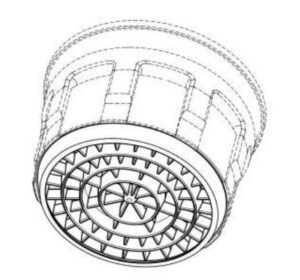To which extent can the General Court review decisions by the EUIPO Boards of Appeal (BoA) is an issue never properly addressed, and one that the CJEU has found to be “significant with respect to the unity, consistency or development of EU law”. Thus, with its order of July 11, 2023, it allowed an appeal to proceed (see case C-93/23, EUIPO v Neoperl).
 The facts are the following. Neoperl sought registration of a tactile mark. EUIPO rejected the application for registration on formal grounds, considering the application to be insufficiently precise. Neoperl appealed and the BoA, rather than determining whether the application had the necessary precision, considered that the sign was devoid of distinctive character and dismissed the appeal on that ground. Neoperl went to the General Court (GC), which annulled the BoA decision (see case T‑487/21, Neoperl v EUIPO).
The facts are the following. Neoperl sought registration of a tactile mark. EUIPO rejected the application for registration on formal grounds, considering the application to be insufficiently precise. Neoperl appealed and the BoA, rather than determining whether the application had the necessary precision, considered that the sign was devoid of distinctive character and dismissed the appeal on that ground. Neoperl went to the General Court (GC), which annulled the BoA decision (see case T‑487/21, Neoperl v EUIPO).
What makes the GC decision highly unusual (to say the least) is that it was not based on a plea raised by Neoperl (who had not challenged the BoA’s decision to examine the trademark application solely with a view to distinctiveness), but on the GC raising this plea of its own motion alleging “breach of the scope of the law”.
EUIPO did not really appreciate the GC’s interference and appealed to the CJEU.
Now, before an appeal to the CJEU is allowed to proceed, it is for the appellant to demonstrate that the issues raised by its appeal are significant with respect to the unity, consistency or development of EU law. This is no easy task, but the EUIPO managed – once again.
In essence, EUIPO argued that the GC had deprived the BoA of its inherent and specific powers and undermined the BoA’s exclusive jurisdiction to review EUIPO’s decision, “arrogating to itself the power to review the examiner’s decisions which is inherent to the BoA” (cf §24 of the order in case C-93/23).
More in particular EUIPO argued that the GC infringed Article 72(3) EUTMR (which concerns the competences of the GC), by finding that the substantive assessment which it carried out relating to the precision of the application constituted a legal issue that had to be dealt with prior to examining the action for annulment brought by the applicant. The EUIPO observed that this was not necessary to review the legality of the BoA’s decision, since it would have been sufficient to examining whether, in failing to assess the precision of the application under Article 4 EUTMR, the BoA had infringed the provisions actually relied on by the applicant at first instance, namely Article 7(1)(b) (distinctiveness).
The CJEU was surely impressed by EUIPO’s arguments.
It acknowledged EUIPO’s emphasis in the cross-cutting nature of the issue of whether the GC exceeded the limits of its jurisdiction by altering the decision of the BoA after examining a plea raised of its own motion, and how the question of the conferral of powers is significant, since the GC is legally bound to act within the limits of the powers conferred on it (God forbid… the GC going rogue!) . The CJEU also considered of particular significance (and not limited to IP law) the issue of the conditions and scope to alter decisions conferred on the GC. The exceedance of that jurisdiction has an impact on the exclusive jurisdiction of the BoA, on the legal protection of the individuals affected by EUIPO’s decisions and, generally, on effective judicial protection.
So, let’s wait to see how this case -which is, constitutionally and politically speaking, of much greater importance than its own proper IP related subject matter (which in itself might have been interesting) – will be decided, keeping however in mind that the “real culprit” i.e. the GC, will not be part of the proceedings and will not be able to defend itself and that it will be Neoperl which will have to do so. Good luck.
On the side: also Neoperl appealed to the CJEU, but Neoperl’s appeal did not successfully take the hurdle of admission (see Case C-64/23 P). In fact this was Neoperl’s second (unsuccessful) attempt to make it to the CJEU (see C-14/20 P from April 2020).
_____________________________
To make sure you do not miss out on regular updates from the Kluwer Trademark Blog, please subscribe here.


